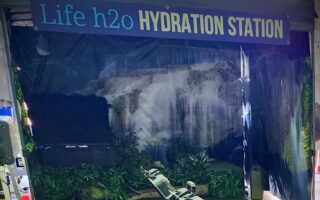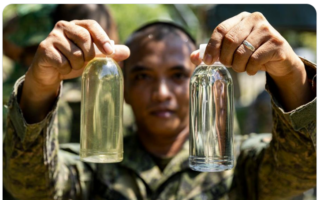NT manufacturer to combat water quality with home-grown, deployable purification system
A Northern Territory manufacturer is set to commercialise a deployable water purification and desalination system (WPDS) with the assistance of co-investment from the Northern Territory Government. Trialled with the Australian Defence Force, and deployed across defence, disaster relief and humanitarian aid campaigns over the past four years, Life h20 in collaboration with TerraCorp Industries and BP Waters will further develop the products towards full-scale manufacture in the Northern Territory.
Dubbed Life-Port WPDS, the mobile water purification system can remove contaminants from any water source, including hard metals, chemicals, minerals, viruses, and bacteria. The military-grade system exceeds water quality standards through the use of pre-filtration, ultra-filtration, and post-filtration processing. It also optimises health benefits by controlling pH levels while reintroducing essential minerals lost during purification. The WPDS can also operate on different power inputs to suit various applications and environments, making it suitable to be deployed with little notice.
Life h2o’s plans will see the company establish a sustainable local manufacturing operation, expand its products into non-military markets, create employment opportunities, and boost NT manufacturing output and exports. As part of this initiative, Life h2o will develop key systems and components locally, including custom military-grade cargo cases to improve supply chain efficiency and meet client demands. Managing Director of Life h2o Charley Feros, said Life-Port is an entirely Territory-developed and tested product, with significant commercial potential for the Top End. “From the outset, we wanted Life H20 to be a Top End company, not just in physical presence but in supply chain, employment and exports. The support Life h20 has gained via the AMEF will enable us to develop a consumer facing product, establish an entirely NT-based supply chain and employ more Territorians, “Life-Port WPDS has been wholly developed in the Northern Territory through leveraging the best Top End knowledge, skills and networks – and we intend to keep it this way and commercialise right here in the NT.” Said Feros. The collaborative project aims to finalise Life-Port’s consumer facing design, secure tooling for onshore manufacturing in Darwin, and commercialise the Life-Port WPDS unit. By streamlining the local supply chain, it will reduce costs, stimulate the NT economy, and achieve the goal of becoming Australia’s first Northern Territory defence prime.
As part of the project, Life H20 has been awarded a $434,978 co-investment from the Northern Territory Advanced Manufacturing Ecosystem Fund (AMEF), administered by the Advanced Manufacturing Growth Centre (AMGC) in total. Accounting for matched cash contributions, the two-year project will commit almost $900,000 towards establishing the new capability.
AMGC’s Northern Territory Director, Charmaine Phillips said: “Life H20’s Life-Port product is exactly what we want to see manufactured in the Northern Territory – a proven, military-grade solution to offering a vital resource – clean water. What’s more is that it is a technology that will have greater impact beyond its military provenance, providing assistance across the commercial, industrial, civilian, disaster relief and primary industries sectors.”
“Providing innovative solutions to meet the growing demand for clean water in regional Australia and the Indo Pacific is not only a testament to Life h2o’s commitment to delivering water security, but also a commitment to sustainability and growth of the NT as a manufacturing hub for the region.” said Phillips.
The project is expected to deliver $5.5 million in additional revenue within five years and create at least fifteen new skilled roles at Life H20’s Darwin facility. Life H20’s project is the eleventh business to receive co-investment through the AMEF, which was launched in 2021. The AMEF has spurred manufacturing activity expecting to create up to 195 new jobs and generate up to $100 million for the Territory’s economy in its first five years.


